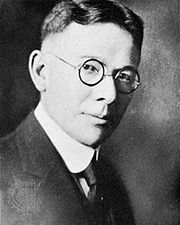Lewis Terman
| Lewis Madison Terman | |
|---|---|
 |
|
| Born |
January 15, 1877 Johnson County, Indiana |
| Died | December 21, 1956 (aged 79) Palo Alto, California |
| Nationality | American |
| Fields | Psychology |
| Institutions |
Stanford University Los Angeles Normal School |
| Alma mater |
Clark University Indiana University Bloomington Central Normal College |
| Doctoral students | Harry Harlow |
| Known for | IQ testing, Positive Psychology of Talent |
| Influences | Francis Galton, Wilhelm Wundt |
| Influenced | Frederick Terman |
Lewis Madison Terman (January 15, 1877 – December 21, 1956) was an American psychologist, noted as a pioneer in educational psychology in the early 20th century at the Stanford Graduate School of Education. He is best known for his revision of the Stanford-Binet IQ test and for initiating the longitudinal study of children with high IQs called the Genetic Studies of Genius. He was a prominent eugenicist and was a member of the Human Betterment Foundation. He also served as president of the American Psychological Association. A Review of General Psychology survey, published in 2002, ranked Terman as the 72nd most cited psychologist of the 20th century, in a tie with G. Stanley Hall.
Terman received a B.S., B.Pd. (Bachelor of Pedagogy), and B.A. from Central Normal College in 1894 and 1898, and a B.A. and M.A. from the Indiana University Bloomington in 1903. He received his Ph.D. from Clark University in 1905.
He worked as a school principal in San Bernardino, California in 1905, and as a professor at Los Angeles Normal School in 1907. In 1910 he joined the faculty of Stanford University as a professor of educational psychology at the invitation of Ellwood Patterson Cubberley and remained associated with the university until his death. He served as chairman of the psychology department from 1922 to 1945.
...
Wikipedia
